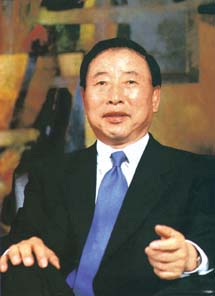Hyosung's Expanding
Global Operation
Company to build tire cord plant in Vietnam, spandex plant in Turkey and solar power plant at home
 Hyosung Corp. continues to expand its global operations, this time by deciding to build a tire cord plant in Dongnai City near Ho Chi Minh City in Vietnam.
Hyosung Corp. continues to expand its global operations, this time by deciding to build a tire cord plant in Dongnai City near Ho Chi Minh City in Vietnam.
The company said recently that it has set up Hyosung Vietnam Co. with $6 million in capital to build a tire cord plant with an annual capacity of 53,000 tons of tire cord at a cost of $160 million by 2010. It reached the decision based on a greatly improved business environment in Vietnam since its admission to the World Trade Association, especially in the areas of foreign trade conditions and the competitiveness of products made in Vietnam. The company feels it can export the tire cords made at its plant in Vietnam to other countries around the world as part of its global operation strategy.
Hyosung officials said when the projected plant is completed, the tire cords can be shipped to Europe, Asia and Latin America where demand for the product has been rising.
 Hyosung has been focusing on the global market for its products since 2000 by building plants in many countries around the world, forming a global production network. The projected Vietnamese plant will secure a supply point for tire cords in Southeast Asia, the company said. Hyosung is a top tire cord maker in the world, producing a variety of tire cords including tire cords made with polyester, nylon, steel, aramid, and rayon.
Hyosung has been focusing on the global market for its products since 2000 by building plants in many countries around the world, forming a global production network. The projected Vietnamese plant will secure a supply point for tire cords in Southeast Asia, the company said. Hyosung is a top tire cord maker in the world, producing a variety of tire cords including tire cords made with polyester, nylon, steel, aramid, and rayon.
In the meantime, Hyosung announced on Oct. 30 it has clinched an order to build a solar power plant in Samrangjin, South Gyeongsang Province, from the Korea Midland Power Co. The diversified company has been expanding its solar power plant construction sector in line with the government's policy to reduce reliance on petroleum by encouraging the development of alternative energy sources due to pollution and green house gas problems. Hyosung has been spurring its efforts to enter the alternative energy sector under the motto of"Global Top Energy Maker."The company plans to step up its effort to enter the power generation market, which is likely to be developed by 2010 with its entry into the solar and wind power generation markets as the base.
Solar electricity is generated by the magnetic field created by solar beams. KEPCO is already operating solar power stations in a number of locations around the country including Taean, Samcheonpo, Donghae, Younghung and Youngkwang, among others, which provide some 2.6 percent of the power generated in the country.
Hyosung has been regarded as the top technology holder of wind power plants in the country and is in the process of commercializing a 750KW-class wind power plant. The company plans to develop a 2MW-class wind power plant in the future.
A Hyosung official said it is difficult to predict what the business environment would be like a decade down the road. "Although the company has been maintaining textiles, heavy industry and tire cord as its major lines of business, we believe the generation of renewable energy is a new growth engine and the one that we should keep developing, as Korea is a poor country in terms of natural resources,"he said.
Hyosung has also decided to invest $130 million to build a spandex plant in Cerkeskoy near Istanbul, Turkey, aimed at the high-end spandex markets in Europe, the company said recently.
The projected plant will have the annual capacity to produce 5,000 tons of spandex when it is completed in 2009, under the management of its Turkish subsidiary Hyosung Istanbul Tekstil Ltd., with $5 million in capital. Hyosung already operates a spandex plant in China and when the Turkish plant is completed, the company will be able to supply high-priced value-added products to Europe where demand for spandex is growing, as it is the material for swimsuits and lingerie.
Hyosung also plans to expand its spandex plant in Guangdong, China, to be able to produce 5,000 tons of the material by investing $35 million in the plant. When the plant is expanded, spandex production in China will rise to 39,000 tons per year.
Hyosung officials said the expansion of the Guangdong spandex plant and the new plant to be built in Turkey are aimed at producing high-priced spandex for Europe as well as to cope with the rising demand for spandex in China.
When these projects are completed, Hyosung's spandex production capacity will rise to 87,000 tons per year. Hyosung took over Tongkuk Trading's plant in China and expanded the spandex production capacity of its domestic plants by 20,000 tons per year recently. nw
Officials of Hyosung Corp. cut tapes to open the company's booth at the Korea Energy Show 2007 held at Coex in southern Seoul Oct.2-5.
Chairman Cho Suk-rae of Hyosung Group.
3Fl, 292-47, Shindang 6-dong, Chung-gu, Seoul, Korea 100-456
Tel : 82-2-2235-6114 / Fax : 82-2-2235-0799